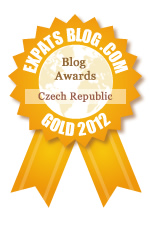 There's quite a bit of bureaucracy involved when having a baby in the ČR. Especially if you are a foreigner. Here's some of the "baby bureaucracy" that Claudia and Norbert have been dealing with. Some of the hoops they are jumping through is because they are not yet married, and some are because they are both foreigners, although they are both EU citizens.
There's quite a bit of bureaucracy involved when having a baby in the ČR. Especially if you are a foreigner. Here's some of the "baby bureaucracy" that Claudia and Norbert have been dealing with. Some of the hoops they are jumping through is because they are not yet married, and some are because they are both foreigners, although they are both EU citizens.The first thing is that the government needs to determine the parental ties. This determination of parental ties is automatic for a married Czech couple because according to Czech law, the woman that delivers the baby is the child's mother. Her husband is automatically the father.
Note: If the child's father is not the woman's husband then the couple has to make a formal declaration of such at the local registry office. The law also states that if a couple gets divorced, but a child is born within 300 days of the divorce, then the divorced husband is automatically the father. If a man is automatically given "daddy" status then he has six months to challenge it.
For people who are not married, and for all foreigners (EU and non-EU), the determination of parental ties is done at the local registry office before the child is born. Since Norbert is from Hungary, ČR required him to submit a notarized and translated copy of his birth certificate. There are different rules for Germany. Claudia had to have her birth certificate notarized and translated. But then she also had to get an apostille. She also had to provide proof from Germany that she is single. Claudia's mom in Berlin got the local register to provide a document that said Claudia has never been registered as married which worked. Again with the translation, notary and apostille.
 While at the registry office, the parents have to declare what the child's name will be on the birth certificate. This means that the parents have to provide both a boy's name and a girl's name. It doesn't matter if the parents already know the child's gender. A boy's name and a girl's name have to be submitted. The parent's also have to agree what the baby's surname will be. Hyphenated last names are apparently not acceptable. If the parents are not married then the child gets the mother's surname. Due to the Czech name thing, a girl's surname would have the -ová suffix unless a petition is requested. However, multiple first names are allowed for the children of foreigners. Once Claudia and Norbert get married they will then be able to legally change the baby's surname.
While at the registry office, the parents have to declare what the child's name will be on the birth certificate. This means that the parents have to provide both a boy's name and a girl's name. It doesn't matter if the parents already know the child's gender. A boy's name and a girl's name have to be submitted. The parent's also have to agree what the baby's surname will be. Hyphenated last names are apparently not acceptable. If the parents are not married then the child gets the mother's surname. Due to the Czech name thing, a girl's surname would have the -ová suffix unless a petition is requested. However, multiple first names are allowed for the children of foreigners. Once Claudia and Norbert get married they will then be able to legally change the baby's surname.When the child is born, the hospital notifies the local birth register. The registry office then issues the child's Czech birth certificate. This is only proof of birth. It has nothing to do with citizenship and residency status.
If a child is born in the USA, then the baby is automatically a U.S. citizen. That's why it is so popular for foreigners to give birth in the USA because the baby is born a citizen and the parents then apply for a family green card. We call them "anchor babies". But is isn't only in the USA. Pregnant women in mainland China try to give birth in Hong Kong so that their baby gets a Hong Kong passport instead of a Chinese passport.
The Czech Republic doesn't play this game. The only way a newborn gets Czech citizenship is if one of the parents is a Czech citizen. In fact, there is not proposed legislation that if the mother is not an EU citizen, then the Czech father will have to take a paternity test in order to prove that the baby is a Czech citizen. I guess there has been a big scam of Czech men claiming to be the father of non-Czech children, giving the baby rights to healthcare and the mother residency status.
If both parents are foreigners then they have 60 days from child's birth to apply for the baby's residency permit. If the parents have different types of residency status then they get to choose the better one for the child. If the 60 day window is missed then the baby has to leave the ČR while a new application is submitted with the Czech Embassy in the parent's home country.
Claudia is German and Norbert is Hungarian (this child will have one heck of a temper) so Tünde will get dual citizenship. They will take translated copies of the Czech birth certificate to the German and Hungarian embassies in Prague. Who knows what kind of paperwork awaits them at the German and Hungarian embassies?




























No comments:
Post a Comment